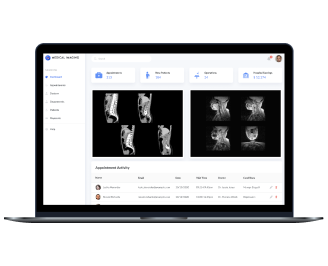Medical E-prescription Platform
Learn how we helped an independent medical software vendor beat the competition and retain key customers with a smart e-prescription module for their existing EHR system.
-
industry
Healthcare
-
Country
USA
-
Team size
30+ specialists
-
Period of collaboration
2017 – present
About the client
Our client is a US-based independent healthcare software vendor that provides highly customized electronic health record (EHR) solutions for hospitals, mental health facilities, and hospices, including four large healthcare delivery organizations.
After discovering that these organizations used third-party eRx tools for medical prescriptions, the client decided to extend the functionality of their web-based EHR system with an order entry module that would handle e-prescriptions for regular and controlled substances as well as orders for laboratory and radiology tests. By doing so, they intended to encourage clients to switch from competitors’ eRx products to their own and create a consolidated ecosystem of their own branded clinical applications.

Business context
To create a full-service ecosystem of clinical applications, our client had to meet the following objectives:
- Find a reliable technology partner who would take full responsibility for prioritizing business and functional requirements and ensuring full HIPAA compliance for the eRx module to keep the whole EHR system HIPAA compliant
- Retain existing clients by increasing their satisfaction with the current EHR solution
- Acquire new healthcare delivery organizations as loyal customers
Solution overview
-
Our client wanted to start with an MVP version of the digital health platform that would allow end users to create orders for Schedule I drugs and laboratory tests. They also decided to equip the eRX module with basic clinical decision support (CDS) functionality.
Our team of business analysts rolled out a plan for an extended MVP that would be competitive enough to effectively cater to end users’ needs within the client’s planned budget and deadlines. The final version of the eRx product is capable of the following:
Managing medication orders
Within a new eRx system, providers can place multiple prescription orders, send orders to a preferred pharmacy, refill prescriptions, as well as track the statuses of prescription orders.
Implementing patient safety features
We enhanced the eRx module with clinical decision support (CDS) functionality to enable drug–drug and allergy alerts for reducing preventable adverse drug events (ADEs). The CDS-enabled eRx system is now capable of checking a prescribed medication against a patient’s medical data (age, weight, diagnoses, allergies, history of previous and current treatments). The system can also alert prescribers of possible contraindications, dangerous doses, potential adverse reactions, and duplicate therapies as well as provide instructions on how to provide better treatment. Providers can replace medication with an alternative.
Sending lab and radiology test orders
We also added functionality to send laboratory and radiology test orders to a particular laboratory and receive results in the EHR system. This feature includes basic decision support to avoid harmful or even life-threatening duplication of test orders. As with prescription orders, providers can save the most commonly used test patterns for a patient for more convenient and faster reordering.
Managing eligibility verification
We had to enable integrations with both insurance formulary databases and pharmacy benefits management databases to ensure access to exhaustive formulary information. By accessing a patient’s eligibility information, the benefit verification functionality in our eRx module is able to communicate the status for each medication prescribed. This helps prescribers determine the most clinically appropriate and cost-effective option for a patient. The system automatically notifies prescribers if a selected drug requires prior authorization. Providers can also submit prior authorization requests via the EHR system to get instant feedback from payers or pharmacy benefit managers while still interacting with a patient.
Ordering controlled substances
Our client wanted to offer the eRx module in three US states: California, Texas, and Michigan. To comply with the US Drug Enforcement Administration (DEA) Interim Final Rule requirements, we enabled prescriber identity proofing and access control to give Electronic Prescriptions for Controlled Substances (EPCS) permissions to approved providers. We also ensured two-factor authentication when signing EPCS prescriptions, integrated with the Narx Score system, and implemented an audit log to track security incidents and ensure compliance with DEA requirements.
Securing patient health records and enabling decision support
Yalantis has developed a fully HIPAA-compliant eRx software solution that meets Drug DEA EPCS requirements and is secure enough to obtain ONC Health IT Certification. The system includes a microservice architecture for quick scalability and maintainability and a software quality control system with a set of testing techniques. The system can retrieve drug information from the DEA and openFDA databases and is integrated with FirstDataBank open API and RxNav for basic decision support.
Value delivered
Together with our client, we’ve achieved the following results:
Before:
-
Medical staff had to switch to third-party e-prescription software to prescribe medications
-
Distorted clinical workflows because of a lack of healthcare software interoperability
-
Security risks due to manual patient data entry into different systems
After:
-
Three out of four partnering healthcare delivery establishments have successfully moved to the new integrated e-prescribing solution
-
Feature-rich and secure eRx system that allows clinical staff smoothly deliver healthcare services
-
Plans to extend the systems with more advanced features including patient referrals, a dosage calculator, and integration with a Prescription Drug Monitoring Program (PDMP) solution
Augment your software to meet new market demands and achieve greater loyalty
Build new functional modules to deliver more value to clients and ensure seamless service delivery
More projects
-

Software development for medical devices
A patient-facing and clinician-facing application for medical devices manufacturer
-

Cloud-based medical imaging system
A system for synchronizing medical images between medical equipment and an EHR system
-

Appointment scheduling system
An all-in-one doctor appointment scheduling platform